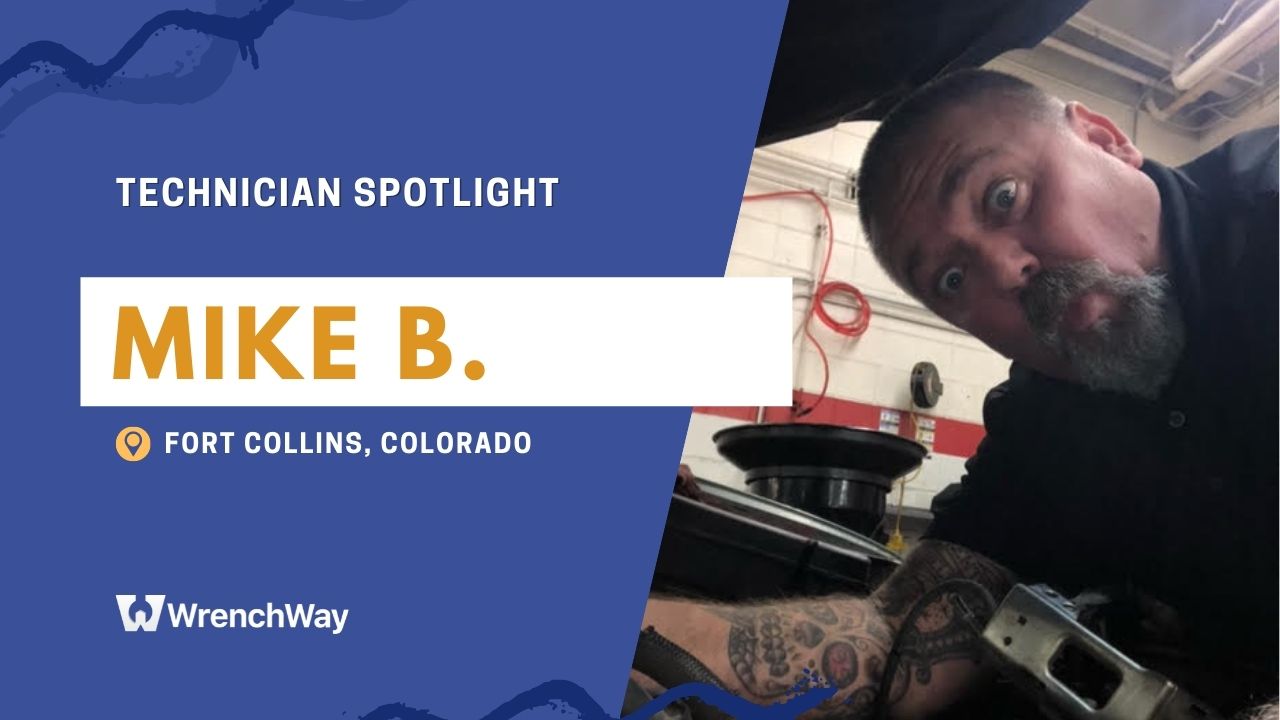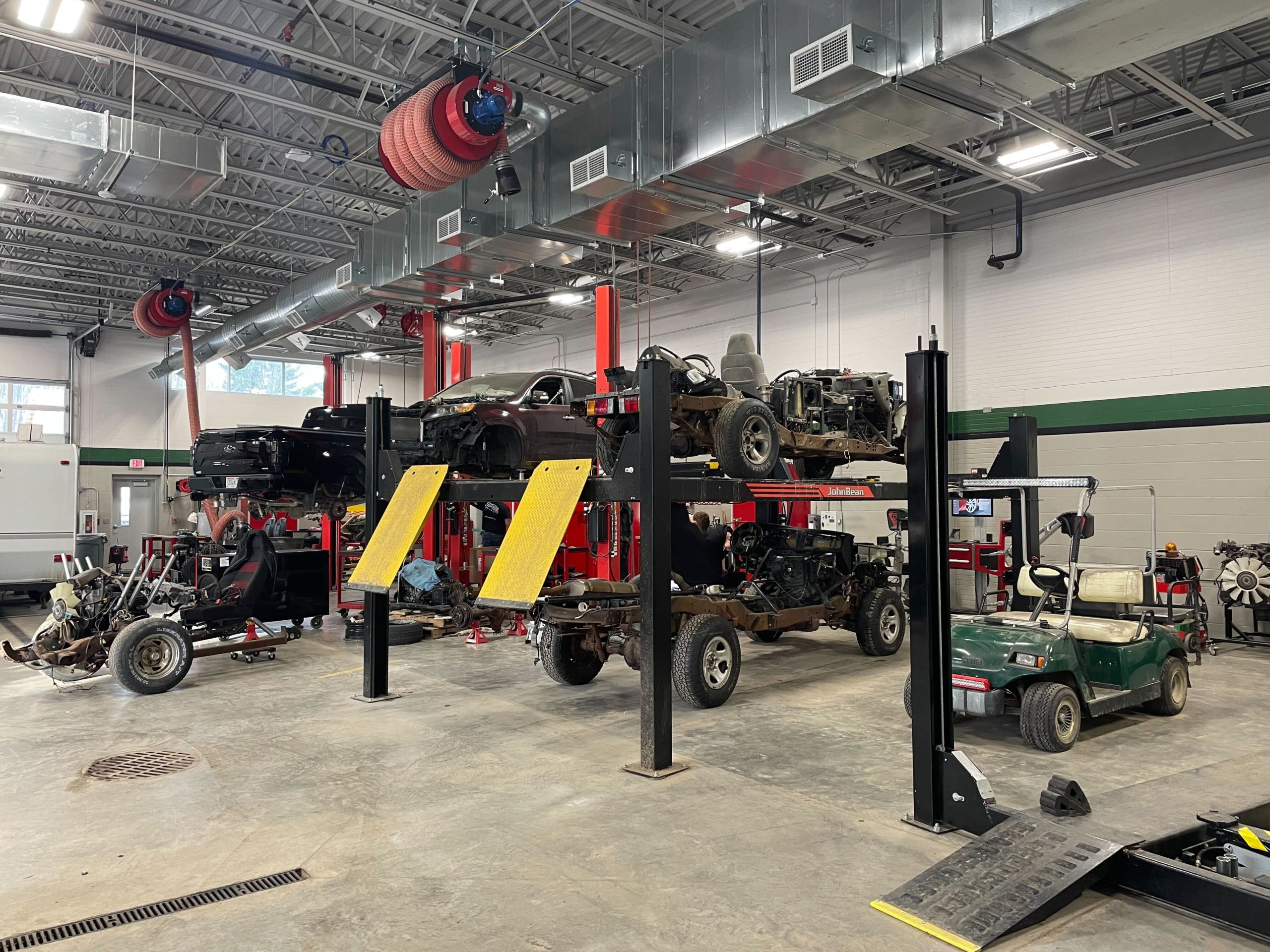This article is part of an ongoing series to highlight and promote the technician career — demonstrating to kids, parents, and teachers how becoming a technician is a rewarding career path that can be lucrative and open the door to many opportunities within the industry.
Name: Mike B.
Location: Fort Collins, Colorado
Job Title: Service Manager
Industry Experience: 26 years
Technician Spotlight: Mike B.
How did you get started in the automotive industry?
I grew up in the automotive business. My grandparents had an auto salvage and used car lot back in the 1950’s. As early as I can remember, I was always around cars. I didn’t know anything different. I never really thought I was going to be a mechanic. I thought I was going to go into the family business of car lots and auto salvage. I never made a plan to be a mechanic, but I was mechanically inclined. My grandparents sold the business in 1993. At that point, we had 11 family members working for the business. I had a really good friend who worked at a Toyota dealership in town. I tried for almost 18 months to get a job there. Finally, they called me back, and I got a job starting as a porter in the body shop. I was emptying trash cans and changing body shop paint filters. The shop never had any turnover — technicians never left. One day a guy did decide to leave, and they had an opening. The service manager called me and told me I was going to be a lube technician. From there, I got a mentor, and he is still my mentor in the business today. I kept moving forward in the industry and getting certifications. Before I knew it, I was a Toyota master technician. At that point, I felt tapped out. I started looking for other avenues, because I had a chip on my shoulder about the industry. I went to work for the state of Nevada as a manager of a fleet shop. Then, I went to work for Universal Technical Institute as an automotive instructor. I tried to do a lot of different things to get a new outlook on the industry. After teaching, I had an opportunity to get back into service management. I got my first opportunity in 2017, and now I am a service manager.
What is your favorite part of being a technician?
At some point in our business, we stopped being “mechanics” and turned into this term “technicians.” It’s when cars got less mechanical and more technical. There’s something to be said for guys who are mechanics. I would never use that phrase in a derogatory manner or as a slight to anybody. I grew up with a lot of mechanics. They taught me to be very resourceful and really good at solving problems other people couldn’t. There were a lot of times guys would be banging their heads on the wall during repairs. I was able to go over and fix something very difficult for other people. Still to this day, I really get a kick out of that.
What’s the best advice you can give to someone looking to enter the industry?
My number one piece of advice, and I used to say this to students when I taught at the campus, is break your career down into bite size pieces. By bite size pieces, I mean into a two-year goal. Students shouldn’t be sitting in a classroom as a high school or trade school student trying to plan the next 30 years. Focus on 18-24 months at a time, and set small goals. If I’m in school right now, I need to get everything I can out of these 18-24 months in the classroom. Then, once you reach your goal, make another two-year goal. Break it down, and always have the next thing, because if you plan too far ahead you can really lose sight of what’s happening now. I’ve found breaking your goals down into small chunks is a lot more digestible and easier to accomplish.
How do you think shops and schools can work together to better the industry?
A very big thing is setting unrealistic expectations for the graduating students. Telling them as soon as they get out of school they’re going to make $75,000 a year or they’re going to be a high level technician right away isn’t realistic. It is so incredibly rare, it shouldn’t even be a statistic. We have to stop setting unrealistic expectations for them. It’s more common they’ll start out on the lube rack, as an apprentice, or a tire guy. It may not be something they’re wanting to hear after they spent a lot of money on their education, but they need to have a real understanding. Shops need to do a better job of nurturing and onboarding new technicians when they come in. They really stress the new technicians out to the point where in two years, they’re gone.
What has being a technician taught you the most/ What skills has your career given you?
I had a conversation with a guy I worked with 30 years ago in this industry. We were talking about the value of being a technician. I’ve learned a lot of things that have nothing to do with automotive, simply because of the mechanical aptitude and resilience being a technician has taught me. I’ve learned how to do plumbing around my house, construction projects, landscaping, and welding. I rarely have to call a repair company to come out and fix something on my house. I’ve acquired tools, knowledge, and confidence to do things outside of my trade, and I don’t feel scared to do it.
If you knew a kid that wanted to go into the industry, but his/ her parents or teachers were telling them to go into a four-year college, what would you tell the parents?
I think we’re probably in the last one or two generations of that right now. My generation was told you need to go to college, and that’s the only way you’re going to be successful. I think there’s more people that went to college, got a four-year degree, and saw their job wasn’t so important. Especially last year, the trades didn’t stop working. I never missed a day. I think that was a big eye opener, or I hope it was a big eye opener for people. I hope parents are a lot more open-minded about their son or daughter going into the trades and support them. You always want your kids to do better than how you’re doing. You can’t tell them what’s right for them — they need to figure it out. I think they don’t want to admit there is a lot of money and job security to be made in the trades.





